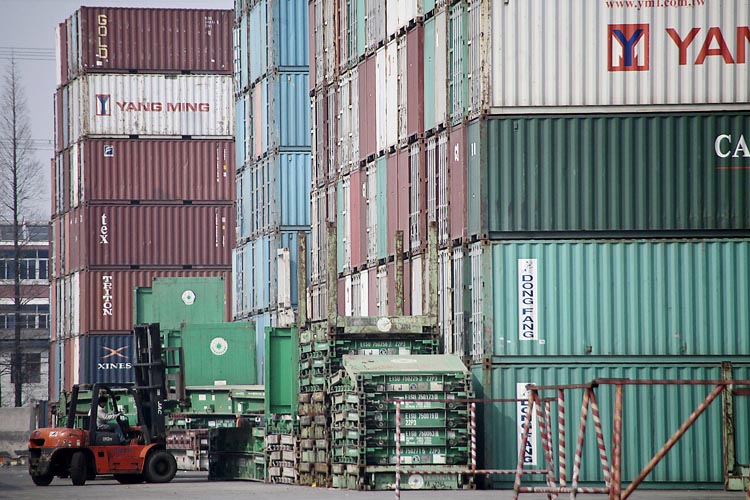SHANGHAI — Signs that the powerhouse Chinese economy is slowing have spooked global markets and sharpened fears that the world economy will not escape another recession, so much so that a small, preliminary survey of Chinese manufacturers contributed to a global stock market plunge this week.
However, analysts said today that the dramatic fallout from a preliminary reading of HSBC’s index of manufacturing for September far exceeded the data’s importance. And while the world’s No. 2 economy is slowing as expected, they said, growth will remain relatively strong.
If nothing else, the market rout that began Thursday and continued today reflects how much the rest of the world is relying on China, one of the few big economies that is expanding at a rapid clip, to stave off recession.
HSBC’s preliminary survey, released about a week before the final survey is due, showed a two-month low of 49.4. That followed an August reading of 49.9, and anything under 50 indicates that activity is contracting.
Coming alongside weak indicators from other major economies, the data prompted panicked selling by global investors afraid that governments hamstrung by debt crises, inflation and unemployment may be unable to avert a recession.
But the HSBC survey is only a monthly snapshot, ill-suited to indicate long-term trends, said Xianfang Ren, chief China economist for IHS Global Insight.
It also is heavily weighted toward exporters, which are bound to be feeling cautious given the current global outlook, and is not a reliable measure of the broader economy, said CLSA analyst Andy Rothman. An official manufacturing index that surveys a bigger number of companies is due around the end of September.
“If you look at other measures of what’s happening in China … everything is cooling down, but not dramatically, and there’s still strong growth,” Rothman said. Most forecasters expect economic growth of above 9 percent this year and between 8.5 percent and 9 percent next year.
Still, what’s clear is that China’s role in powering world growth is significant.
That’s especially so for nations such as Australia that are heavily dependent on China’s voracious demand for the minerals they export, and for export-reliant countries in Asia including Singapore, Taiwan and Japan. The Conference Board forecasts China will account for about a third of the increase in global GDP this year.
Yet despite China’s rising power, experts say its economy is still not big or strong enough to fully compensate for meltdowns elsewhere, since its own investment and spending is only one-sixth that of the European Union and United States.
“From a global perspective, China’s domestic demand is still way too small to offset the impact of a recession” in Europe and the U.S., Deutsche Bank economist Ma Jun said in a report.
To make up for a 3 percentage point drop in growth in those economies, China would have to grow by 18 percent this year, he says.
“This is mission impossible.”
Some worry that China’s economic planners in their zeal to reduce inflation from near three-year highs could overshoot by cooling the economy too much. August’s inflation figure of 6.2 percent, down from 6.5 percent in July, suggests that Beijing’s inflation battle may be yielding results that would allow it greater leeway for policies aimed at keeping growth on track.
A drop in global demand for China’s exports could also wallop its economy, as it did in 2008, though domestic factors such as consumer spending and investment in infrastructure are increasingly driving growth.
Most economists still downplay any risk of a so-called “hard landing” in China that would darken the global outlook.
Such fears are “unwarranted,” said HSBC’s own economist Hongbin Qu. “Resilient domestic demand is sufficient to support around 8.5 percent to 9 percent growth in the coming quarters.”
China’s advantages over other major economies include its relatively low level of debt despite growing worries over local government borrowing, its cash-rich corporate sector and pent-up demand among its newly affluent consumers.
Massive stimulus spending launched in response to the 2008 global crisis is still washing through the economy, driving sales for both heavy industries like steel and cement, and light ones such as appliances, clothing and home furnishings.
“Chinese companies are making money and the private consumption is increasing. If we assume government spending remains at the current level, the economy will continue to grow,” said Peng Yunliang, a strategist with Shanghai Securities.
Earlier this week, the International Monetary Fund cut its growth forecast for China this year, but only by one tenth of a percentage point to 9.5 percent.
In revising its outlook for China, the IMF reiterated its advice to Beijing to do more to spur consumer demand, in part by improving social services to help relieve pressures on families to save disproportionate amounts of their income to cover their medical, education and retirement needs.
Copy the Story LinkSend questions/comments to the editors.



Success. Please wait for the page to reload. If the page does not reload within 5 seconds, please refresh the page.
Enter your email and password to access comments.
Hi, to comment on stories you must . This profile is in addition to your subscription and website login.
Already have a commenting profile? .
Invalid username/password.
Please check your email to confirm and complete your registration.
Only subscribers are eligible to post comments. Please subscribe or login first for digital access. Here’s why.
Use the form below to reset your password. When you've submitted your account email, we will send an email with a reset code.